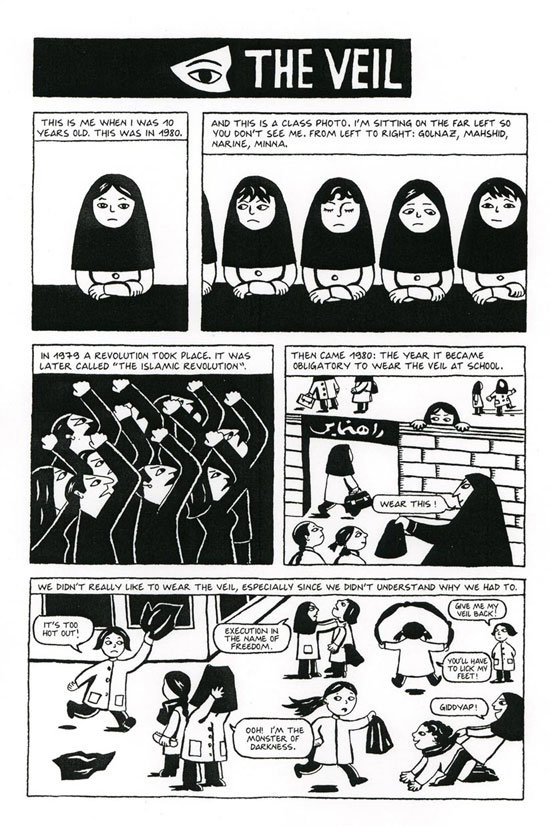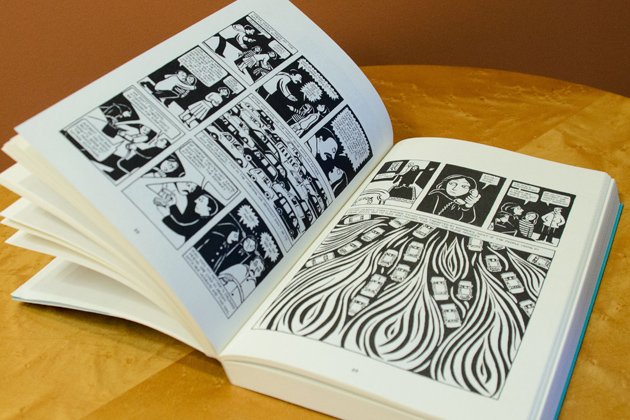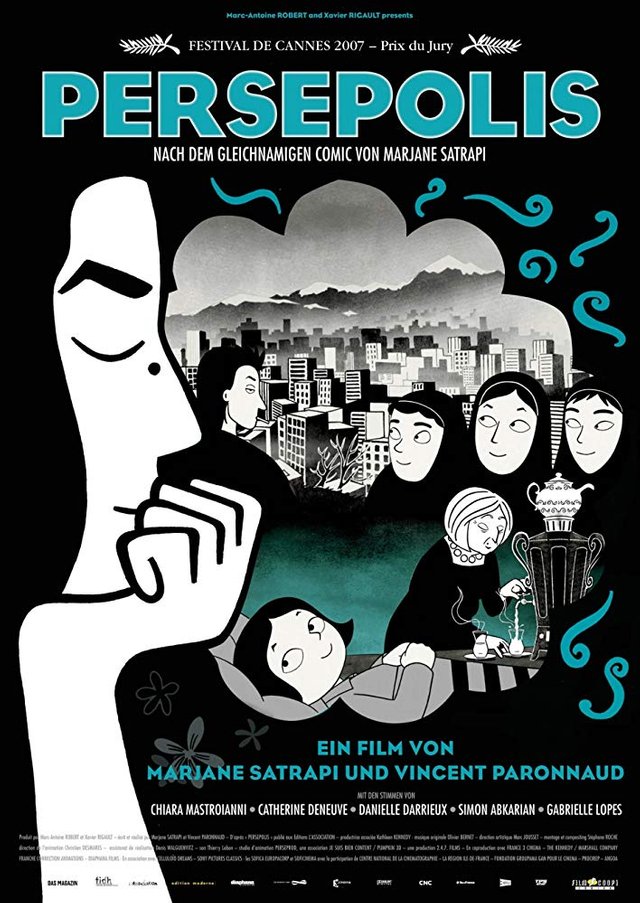Persepolis (Movie): a current history.

"Persepolis" is an animated French film, directed by Vincent Paronnaud. It's based on a graphic novel of the same name, written and illustrated by Marjane Satrapi, who also co-directs and co-produces the film. It's an autobiographical story that tells the life of Satrapi from a happy childhood in Iran in the late 70s, through the Islamic revolution, to our days when she's already a grown up woman.
It's what in literature is known as a "novel of formation", that transition from childhood to adulthood. The issue is that, in addition to discovering the attraction for the opposite sex, the songs on the radio, of forging a personality, basic things in adolescence, Satrapi faces much more serious issues: an armed revolution in which a fundamentalist sector takes power in Iran and installs a theocratic and totalitarian regime, forcing women to use the veil and imprisoning thousands of people. That's followed by the war between Iraq and Iran.
To protect her from this unfavorable environment for her development, her parents send her to Europe where she finds another culture, completely different, and other freedoms that may seem obvious to those who have them, but that mean a lot to those who have lost it. A scene that reflects this is the joy of Marjane when she enters a supermarket and sees products that had disappeared from the shelves of her native Iran packed with the characteristic normality of a supermarket shelf.
Marjane grows up, discovers punk and likes Iron Maiden. She adapts quite well to her new life, the university, her classmates, but she can't stand loneliness and guilt (she is well, knowing that her relatives are having a hard time) and after a loving setback she decides to return to Iran with her family , even if that means putting on the veil and submitting to a tyrannical government.
On her return she discovers that she feels as foreign in his country as she felt outside. Things have changed a lot and not for the better. Later, after a series of unfortunate experiences, she leaves the country where she was born.
Similarity with Venezuela:
In the film we can see scenes like these: two women fighting for a product in an almost empty supermarket; the loneliness and darkness of the streets at night; the drastic reduction of leisure and entertainment spaces; purchase of items on the black market; the protests against the government reprimanded with bullets; protesters killed, tortured, imprisoned or disappeared; the massive migration of citizens, especially young people, who flee from the situation looking for a better future.
Satrapi tells what she lived more than twenty years ago. But those scenes are still happening today in other places. Such is the case of Venezuela, whose resemblance to the events narrated in the film caused me a deep, although surprising, sadness.
The situation in Persepolis is more serious than the Venezuelan because here there's not a religious and misogynist radicalism, Venezuela is not at war with any neighboring country and doesn't have a theocratic regime. However, 40 years after the Islamic revolution in Iran, the current situation of crisis in Venezuela has brought consequences very similar to those that Marjean had to face with a suffocating present and a not very hopeful future.
I liked the movie used the same style of simple caricature that is seen in the original book. I applaud when animated films deal with serious issues and are thought like something more than "children's movies". The well worked details on the movie, no doubt, are due to the fact that Satrapi herself was involved in the direction and production. By the way, there's another respectable film adaptation of another of her books, "Chicken with plums" ("Poulet aux prunes"), which I would also recommend to see.
For the good animation, a script that combines very well dramatic situations with other more graceful and moving; the treatment of important issues such as religion, religious radicalism, abuse of power, feminism, misogyny, migrations; the defense of freedom in all its areas; and by its similarities with the reality that crosses my country (I recognize here the victory of subjectivity) I grant 7/10 to this film, worthy not only to see, but also to spread.
Reviewed by @cristiancaicedo
Other posts that may interest you:
The Reader (Movie): the weight of guilt and pride
1Q84 (Book): The best of Haruki Murakami?
Inside Llewyn Davis (Movie): The funny side of tragedy
The Neon Demon (Movie): symbolism and references explained
The Neon Demon (Película): simbolismo y referencias explicadas
Persépolis (Película): una historia vigente



